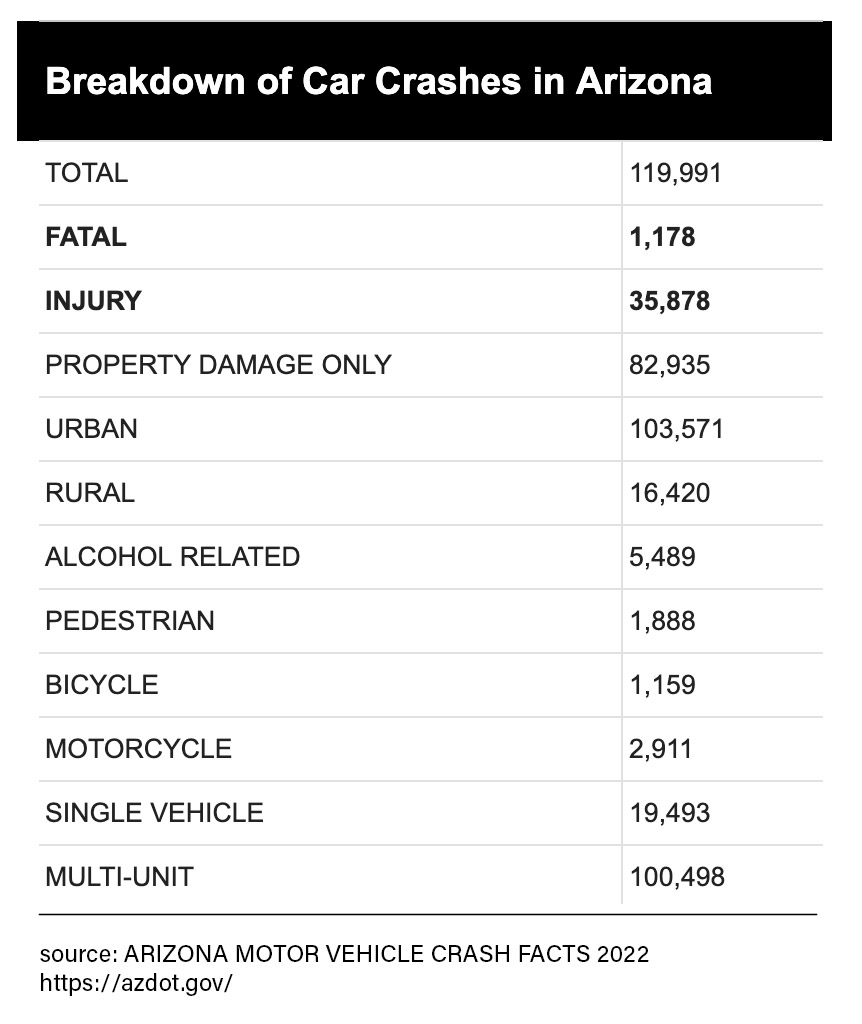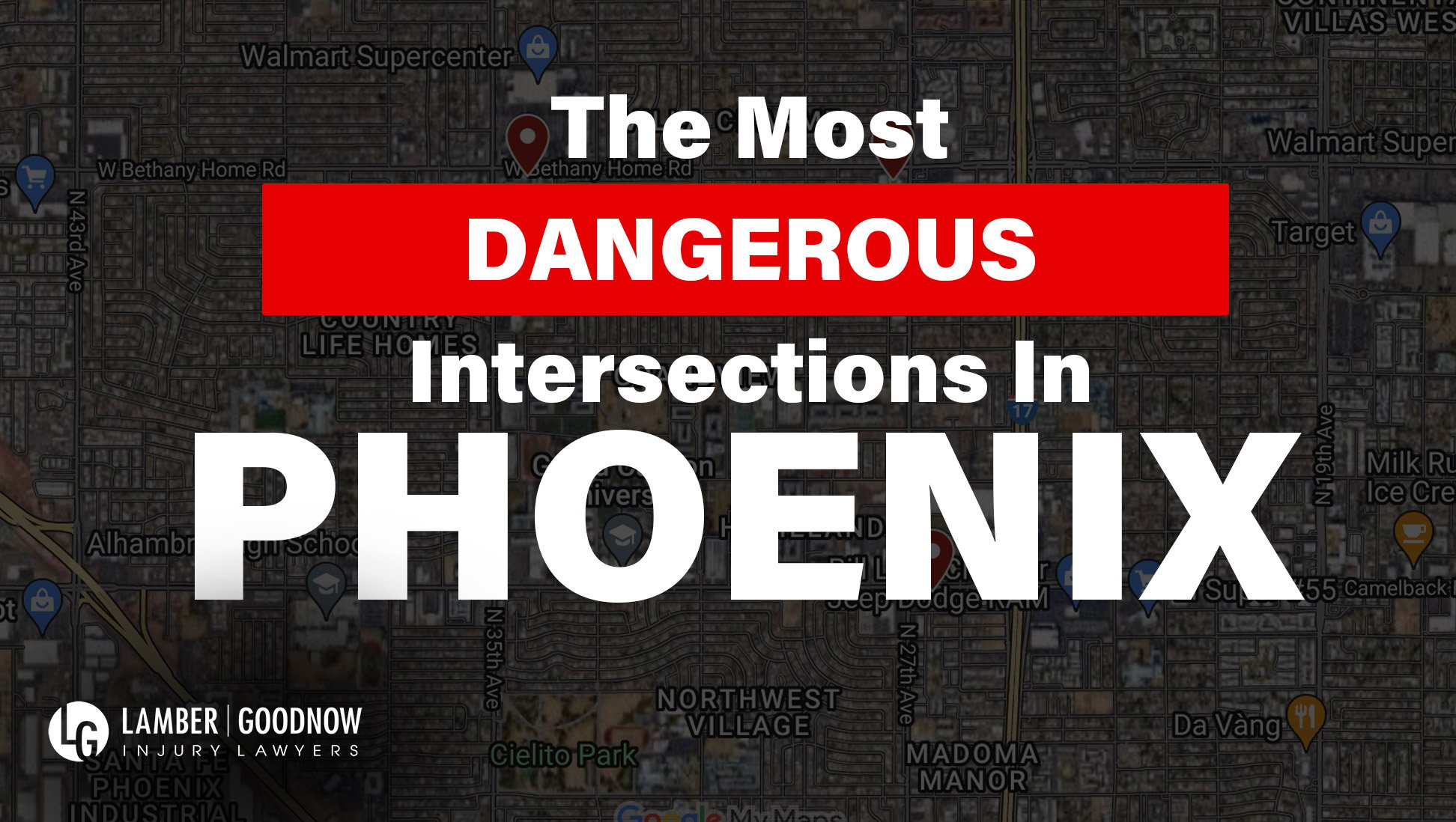Phoenix Car Accident Lawyers
EXPERIENCE. STRAIGHT TALK. JUSTICE.
99% Success Rate
550+ 5-Star Reviews
$0 Fee Unless We Win
Meet Marc Lamber
99%!
Won or Settled*99% Success Rate.

Over 550 5 Star Reviews
0$
No Fee PromiseNo fee unless you get paid.
We are the legal experts the media calls


Lamber Goodnow Injury Lawyers
Phoenix Office
Experienced Phoenix Car Accident Lawyers Who Have Your Back
With over 30 years of experience, Marc Lamber and the Phoenix car accident attorneys at Lamber Goodnow Injury Lawyers have your back — protecting you from aggressive insurance companies, handling the legal heavy lifting, and fighting for every dollar you deserve. While you focus on healing, we take care of the rest — providing relentless representation, personalized support, and a no-fee promise from start to finish.
In addition to serving clients across Phoenix, our experienced car accident attorneys proudly represent individuals injured in Mesa, Scottsdale, Glendale, Peoria, Tempe, and other neighboring communities throughout the Valley.

Straight Talk From Marc Lamber
“Recovering from a car accident is deeply personal — but pursuing justice shouldn’t be something you face alone. Our reputation is built on relentless advocacy, holding those at fault accountable, and never backing down when it matters most. With a 99% success rate and a record that speaks for itself, we’re here to fight for you — and win.”
Car Accident Hotspots in Phoenix
Phoenix’s major highways, including Interstate 10, Loop 202, and Interstate 17, see a high volume of traffic and frequent accidents. Busy intersections such as 19th Avenue and Camelback Road, and Indian School Road and 67th Avenue, are also known for a significant number of collisions. Our attorneys understand the local roadways and how dangerous driving patterns in these areas contribute to serious injuries.
In addition to these areas, drivers frequently encounter accidents on Loop 101, especially near Scottsdale Road and the Pima Freeway corridor. State Route 51 (the Piestewa Freeway) also experiences congestion and crashes, particularly near Northern Avenue and Shea Boulevard exits. Bell Road, one of Phoenix’s busiest east-west corridors, is another common site of multi-vehicle accidents.
Other notable hotspots include the downtown Phoenix area — particularly during rush hour — and around Arizona State University (ASU) in Tempe, where heavy pedestrian, bicycle, and student traffic can increase collision risks. Knowing these accident-prone areas can help drivers stay alert and potentially avoid dangerous situations on Valley roads.
Why You Need an Accident Lawyer in Phoenix
Arizona’s accident laws — especially in car crash cases — are some of the most complex in the country. The state follows a fault-based system, meaning the driver who caused the accident is financially responsible. Arizona also applies pure comparative negligence, which allows you to recover compensation even if you were partially at fault.
These legal nuances can make or break your case. One wrong move could cost you compensation for medical bills, lost income, vehicle damage, and emotional suffering. That’s why working with an experienced accident lawyer in Phoenix is critical. We know how to navigate the system — and how to protect your rights at every turn.
When you choose Lamber Goodnow Injury Lawyers, here’s what you can expect:
No-fee case evaluation
We’ll review the details of your accident, explain your rights, and give you an honest, upfront assessment — with zero obligation.
Thorough Investigation
We gather police reports, witness statements, expert opinions, and all relevant evidence to build the strongest case possible.
Aggressive Negotiation
We take on the insurance companies and fight for full compensation — for your injuries, property loss, and emotional distress.
Trial-Ready From Day One
If the other side won’t play fair, we’re fully prepared to take your case to court and pursue the justice you deserve.
How Much Could Your Phoenix Car Accident Case Be Worth?
Phoenix Car Accident Trends — and Why the Right Lawyer Matters
New data from the Arizona Department of Transportation reveals a troubling trend: Phoenix remains one of the top cities in the nation for motor vehicle crashes. In 2023, there were 38,311 reported crashes within the city limits — and more than a quarter involved injury or fatality.
The most common causes of accidents in the Phoenix metro area include:
- Speeding and aggressive driving
- Unsafe lane changes and failure to yield
- Distracted driving (including texting and smartphone use)
- Driving under the influence of alcohol or drugs
- Fatigue and drowsy driving
These dangerous behaviors lead to nearly 15,000 crashes annually across Arizona. In Phoenix alone, nearly 9,000 accidents each year involve serious injuries or fatalities.
Compared to other major cities, Phoenix consistently ranks near the top for fatal crashes, alongside places like Los Angeles and Houston. With a younger-than-average population (median age 34.8 years) and a high rate of multi-vehicle households, the Valley’s roadways see constant congestion — and increased risks.
After a crash, insurance companies act quickly — often offering low settlements before victims understand the full extent of their injuries. Having the right attorney on your side can make all the difference.
At Lamber Goodnow Injury Lawyers, we bring decades of experience, a 99% success rate, and millions recovered for Arizona families. Our team knows how to fight back, protect your rights, and maximize your recovery — while providing the compassion and straight talk you deserve.
When your future is at stake, don’t settle for less. Work with the team that Phoenix trusts after serious crashes — Lamber Goodnow Injury Lawyers.
Auto Accident Legal Services in Phoenix
Choosing the right automobile accident lawyer isn’t just about hiring the first one who picks up the phone. It’s about working with a team that knows how to fight — and win — the compensation you deserve. At Lamber Goodnow Injury Lawyers, we represent thousands of Phoenix residents every year, helping them navigate the legal system with confidence and clarity.
With decades of experience, a 99% success rate, and millions recovered, our track record is second to none. As part of Arizona’s oldest law firm, we combine legacy with innovation to deliver results when it matters most.
Why Clients Trust Our Phoenix Car Accident Lawyers
- 99% Success Rate: We’ve won or settled thousands of cases, securing substantial compensation for injury victims.
- Local Expertise: Our attorneys know Arizona car accident laws inside and out — giving you a strategic edge.
- Personalized Strategy: No cookie-cutter cases here. We build customized legal approaches to maximize your recovery.
- No Upfront Fees: You don’t pay us a cent unless we win your case.
- Proven Leadership: Led by Marc Lamber, a Phoenix native and top-rated trial lawyer with over 30 years of experience.
If you’ve been injured in a car crash, don’t settle for less. Contact Lamber Goodnow Injury Lawyers today for a free consultation — and let us fight for the justice and compensation you deserve.
Award-Winning Phoenix Accident Attorneys
Our reputation goes beyond results. We’ve been named a Top Lawyer by Phoenix Magazine and recognized as the leading personal injury firm in the nation by Attorney at Law Magazine. These accolades reflect our relentless advocacy, legal skill, and client-first approach.
We Handle All Types of Vehicle Accidents in Phoenix
We’re known for car accidents — but we handle so much more. Our Phoenix injury lawyers represent clients in:
- Car accidents
- Motorcycle accidents
- Truck & commercial vehicle accidents
- Pedestrian accidents
- Bicycle accidents

What to Do After a Car Accident in Phoenix
The moments after a car accident can be overwhelming and chaotic. But what you do next can have a major impact on your health, your case, and your future. If you’re involved in a crash, follow these five steps to protect yourself — and your legal rights:
- Seek Medical Attention Immediately
Even if you feel fine, injuries like whiplash or internal trauma may not be obvious right away. Paramedics can assess your condition and create a medical record — which is crucial for your health and your claim. - Call the Police
Law enforcement will secure the scene, ensure safety, and file an official accident report. This report is often key evidence in proving liability and protecting your case. - Exchange Information
Get the other driver’s name, contact info, license number, and insurance details (including policy number). Stay calm and don’t admit fault — even if you feel partially responsible. - Document the Scene
Take photos of the vehicles, the road, traffic signs, injuries, and any property damage. If there are witnesses, collect their names and phone numbers. - Contact a Phoenix Car Accident Lawyer
Before talking to insurance companies, speak with an experienced attorney. The team at Lamber Goodnow Injury Lawyers will review your case, guide you through next steps, and help protect your rights — starting with a free consultation.
Lamber Goodnow Is Your Experienced Phoenix Car Accident Attorneys
With over 30 years of experience and a 99% success rate, we know how to build strong cases and win for accident victims across the Valley. From your first call through resolution, our Phoenix car accident lawyers are by your side — making the process easier, and the results better.
The Most Dangerous Intersections for Car Accidents in Phoenix
Some intersections in Phoenix are notorious for frequent and serious car accidents. If you’ve been involved in a crash near one of these high-risk areas, you’re not alone — and you may have a strong claim.
View a heat map of the most dangerous intersections in Maricopa County →
Navigating Insurance Company Tactics After a Phoenix Auto Accident
After a crash, insurance companies are quick to reach out — often with a lowball settlement or questions designed to reduce your claim. Arizona is a fault-based state, which means the at-fault driver’s insurance should pay. But don’t expect them to make it easy.
At Lamber Goodnow Injury Lawyers, we help our clients understand how to deal with insurance adjusters, protect their rights, and avoid common traps. Before speaking to any insurance company, contact our team for a free consultation.
Frequently Asked Questions: Car Accidents in Phoenix
Who pays my medical bills after a car accident in Arizona?
If another driver is at fault, their insurance should cover your medical expenses through bodily injury liability coverage. If you’re at fault, your own health insurance (or MedPay, if you have it) may apply. If the at-fault driver is uninsured, your own uninsured motorist coverage can help cover costs. Your attorney may also help negotiate with medical providers to delay billing until your case is resolved.
Should I talk to the other driver’s insurance company?
No — not before speaking with a lawyer. Insurance adjusters may try to get you to say things that weaken your claim. Let your attorney handle communications to protect your rights and ensure fair treatment.
What if I was partially at fault for the crash?
Arizona follows a pure comparative negligence rule, which means you can still recover compensation even if you were partly at fault. Your total compensation will be reduced by your percentage of fault.
Do I need a police report to file a car accident claim?
While not legally required, a police report can be a critical piece of evidence in proving fault and protecting your claim. It’s always best to call the police and ensure an official report is filed at the scene.
How long do I have to file a car accident claim in Arizona?
You typically have two years from the date of the accident to file a personal injury claim in Arizona. However, certain factors can affect deadlines — so speak with an attorney as soon as possible to protect your rights.
What happens if the other driver doesn’t have insurance?
If you have uninsured/underinsured motorist (UM/UIM) coverage, you can file a claim under your own policy. Our team can help you understand your options and file against any available sources of compensation.

What’s My Phoenix Car Accident Case Worth?
Locations
Lamber Goodnow Injury Lawyers
Phoenix, Arizona
602-ARIZONA (602-274-9662)
2394 E Camelback Rd #600
Phoenix, AZ 85016
Lamber Goodnow Injury Lawyers
Denver, Colorado
303-800-8888
1330 Logan St Suite B2,
Denver, CO 80203
Lamber Goodnow Injury Lawyers
Tucson, Arizona
520-477-7777
4023 E. Grant Rd Suite 101,
Tucson AZ 85712.

